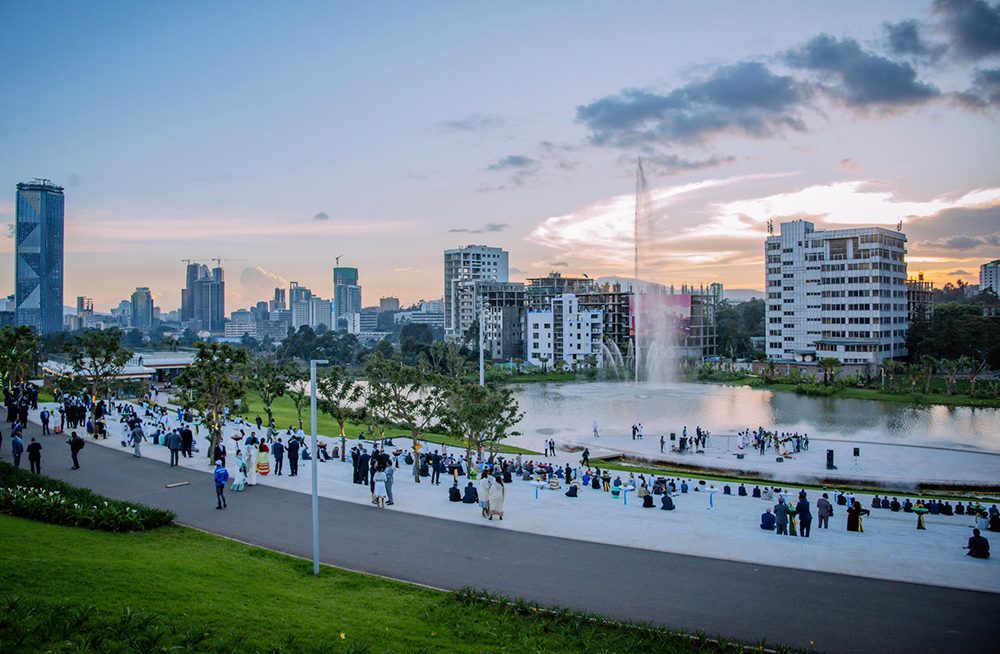Over the last two decades, Ethiopia has been one of the fastest-growing economies in the world. As a result, Ethiopian cities have been struggling to meet the mounting demand for affordable housing, land and accompanying infrastructure. With the support of the Hague Academy, local governance practitioners are working hard to tackle these challenges and to develop inclusive and participatory urban policies.
Andualem Tenaw is the Director-General of the Ethiopian Cities Association (ECA), an organisation that aims to support city administrations in their efforts to provide better services to their constituents. They do so by maintaining a network of cities and stakeholders that facilitates knowledge sharing and capacity building for local administrators.
One of the challenges faced by the association is that urban growth is outpacing cities’ abilities to provide key infrastructure.
 “Rapid growth of urban areas enables the growth of unplanned, informal settlements on the borders of cities. These settlements are characterised by a dense proliferation of small, makeshift shelters built from diverse materials, also called ‘moonshine houses’, since people squat on the land during the dark hours of the night. These settlements face lack of public services, degradation of the local ecosystem, and severe social problems.”
“Rapid growth of urban areas enables the growth of unplanned, informal settlements on the borders of cities. These settlements are characterised by a dense proliferation of small, makeshift shelters built from diverse materials, also called ‘moonshine houses’, since people squat on the land during the dark hours of the night. These settlements face lack of public services, degradation of the local ecosystem, and severe social problems.”
Providing much-needed alleviation to the vulnerable population in such settlements is already an enormous policy challenge. And yet, overlapping with this growth of informal settlements is an increase of urban violence, social distress, political unrest and urban disasters such as fires, public health risks and environmental deterioration. This adds an urgent need for local administrators to tackle the urban crisis before this cycle of challenges intensifies.
“These challenges demand urban leaders to provide solutions and to develop inclusive policies for vulnerable people, especially those living in informal settlements.”
While being a federalised state today, Ethiopia does share a history of diffused, local governance with other large African nations. Until recently, Ethiopia’s Woredas (sub-districts) had been centrally controlled, exhibiting a system of vertical authority that did not allow for meaningful practice of local governance. Nevertheless, institutional reforms since 2000 have aimed at strengthening the role of local governments, establishing cities as effective political and administrative entities with the ability to mobilise resources of their own. The Ethiopian Cities Association is at the forefront of the country’s initiatives to foster a stronger tradition of local governance.
To assist them on their goals, The Hague Academy has partnered with the association to deliver ad-hoc training for governance practitioners. With support from the Orange Knowledge Programme, funded by the Dutch Ministry of Foreign Affairs, the training aims to strengthen the association’s ability to provide capacity building, networking and learning for its member cities. The programme will strengthen training development and facilitation skills, including several train-the-trainer sessions and pilot trainings for Ethiopian cities.
According to Andualem, “the training will help the association to better support Ethiopian cities to develop policies for more inclusive and participatory urban planning, more effective decentralisation and local democratic governance and to promote social cohesion and conflict prevention.”
_____________________________________________________
Are you interested in receiving tailor-made training for your organisation? Visit this page.
[gravityform id=”3″ title=”true” description=”true”]
Related courses
We offer a diversity of courses throughout the year. Here are several other courses you might like.


